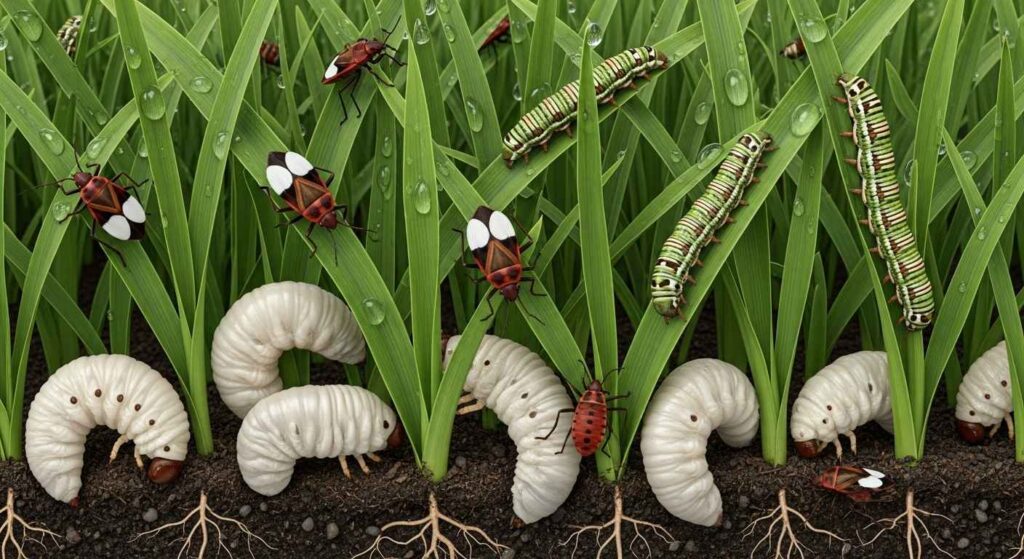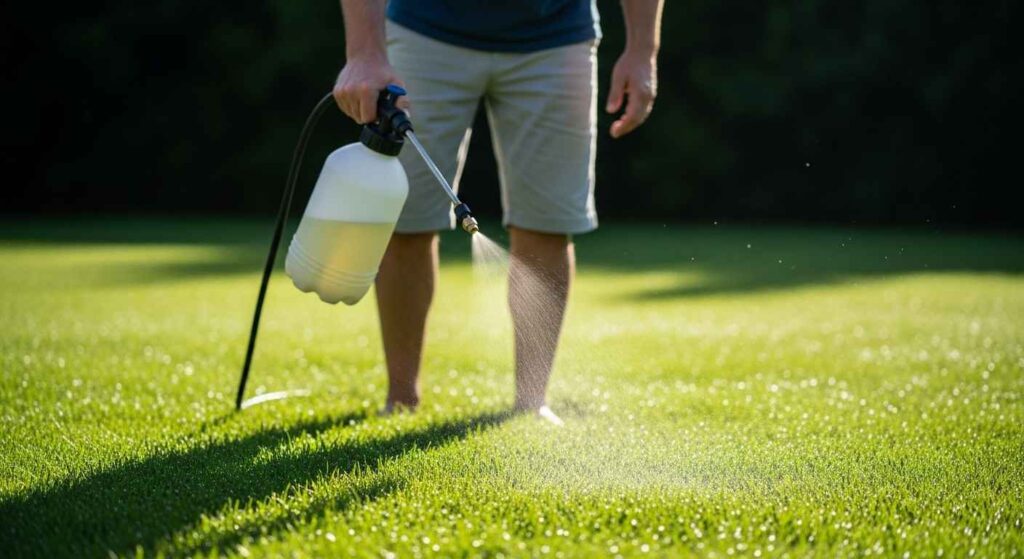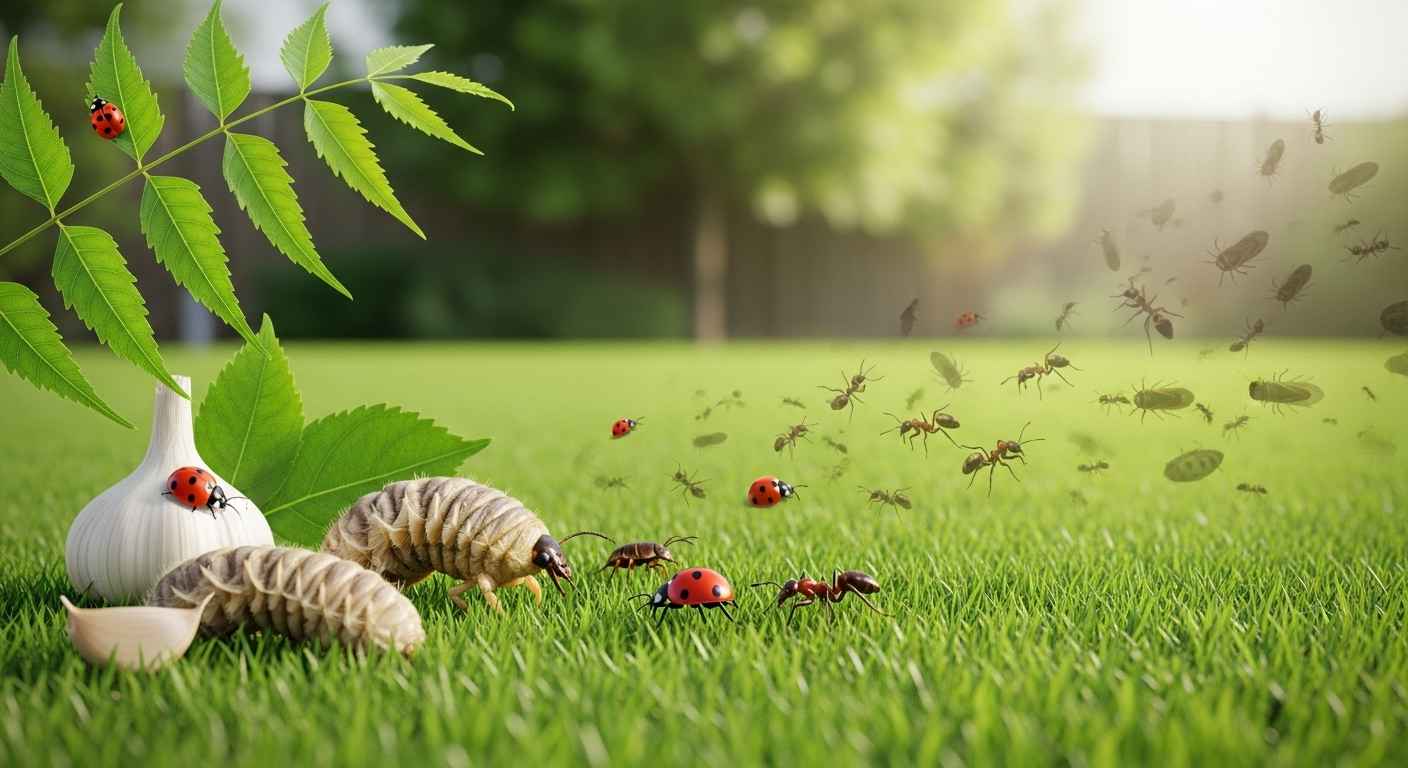Many homeowners face pests in their lawns. These bugs can harm grass and plants. Chemical sprays often cause problems for pets, kids, and wildlife. Natural methods offer a better choice. They keep your yard healthy without harm. This guide shares simple ways to control pests. You will find steps that work well.
Why Choose Natural Pest Control?
Natural ways help the environment. They avoid toxic chemicals that pollute water. Healthy lawns resist pests on their own. These methods support good bugs that eat bad ones. Families stay safe. Pollinators like bees thrive too. Studies show natural options reduce pest numbers over time. They cost less in the long run.
Common Lawn Pests to Watch For
Know your enemies first. Spot them early to act fast. Here are top pests in lawns:
- Grubs: White larvae under soil. They eat roots. Signs include brown patches.
- Chinch bugs: Small insects that suck grass juice. They cause yellow spots.
- Ants: Build mounds. Some types bite or damage roots.
- Armyworms: Caterpillars that chew grass blades at night.
- Moles and voles: Dig tunnels. They eat roots or grubs.
Look for wilting grass or holes. Check soil by digging small spots.

Key Natural Control Methods
Use these proven ways to fight pests. Apply them when you see signs. Always test on a small area first.
Neem Oil Spray
Neem oil comes from tree seeds. It stops pests from eating or growing. Works on aphids, beetles, and caterpillars. Mix two tablespoons with one gallon of water. Add a drop of soap. Spray on grass in the evening. Repeat every week. It also fights fungus.
- Safe for most bugs that help your yard.
- Wash tools after use.
- Buy pure neem for best results.

Diatomaceous Earth
This powder is made from tiny fossils. It cuts pest skins and dries them out. Good for ants, fleas, and ticks. Spread it dry on problem areas. Use food-grade type. Reapply after rain. It helps soil too.
- Wear a mask when spreading.
- Avoid windy days.
- Pets can walk on it safely.
Beneficial Insects
Bring in nature’s helpers. Ladybugs eat aphids. Nematodes kill grubs in soil. Buy them online or from garden stores. Release them at dusk. Plant flowers to attract them.
- Examples: Praying mantises for flies, birds for worms.
- Keep your yard diverse for balance.
For more on plants that attract good insects, check our guide on companion planting basics.
Garlic Spray
Make this at home. Crush garlic cloves. Soak in water overnight. Strain and spray. It repels many bugs with its smell. Use on ants and caterpillars. Refresh every few days.
- Add pepper for extra strength.
- Cheap and easy.
Essential Oils
Oils like peppermint or citronella drive pests away. Mix a few drops with water. Spray around edges. Works for mosquitoes and ants. Test on grass first.
- Blend with soap to stick better.
- Smells good for people.
Other Options
- Milky spore: Targets grubs. Spread once a year.
- Bacillus thuringiensis (Bt): Kills caterpillars. Safe for other life.
- Vinegar mix: Repels ants and fleas. Use white vinegar diluted.
Learn about tools for these methods in our post on best tools for lawn maintenance.
Prevention Tips for a Pest-Free Lawn
Stop pests before they start. A strong lawn fights back.
- Build good soil: Add compost each season. It feeds roots.
- Mow high: Keep grass at 3 inches. It shades out bugs.
- Water deep: Do it less often. Wet soil to 6 inches.
- Aerate: Poke holes in soil. Helps roots grow strong.
- Remove thatch: Rake if thicker than half an inch.
Avoid mistakes with our article on lawn care mistakes beginners make. For dry areas, see how to create a drought-resistant lawn.
Plant tough grass types. Find options in best grass types for different climates. Use natural fertilizers from our best fertilizers guide.

Answers to Common Questions
Readers often ask these. Here are clear answers.
How Do I Keep Pests Out Without Chemicals?
Focus on healthy practices. Mow right. Water well. Add good bugs. Use sprays like neem.
What Organic Methods Work for Insects?
Try diatomaceous earth for crawlers. Neem for suckers. Nematodes for soil pests.
Are Natural Ways Safe for Pets?
Yes. Most are non-toxic. Check labels. Keep pets off wet areas.
How Often Should I Apply These?
Every 7 to 14 days for sprays. Once a season for powders like milky spore.
Can I Use These on Plants Too?
Many work for gardens. See our organic pest control for potted plants.
For more facts, visit the EPA site on safe pest control.
Follow these tips for a yard you love. Start small. See changes soon. Your lawn will thank you.
